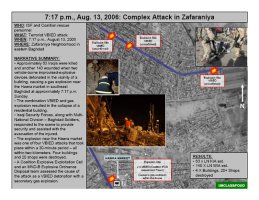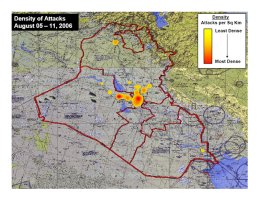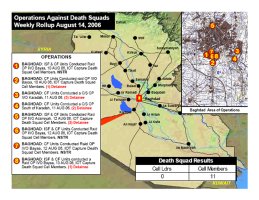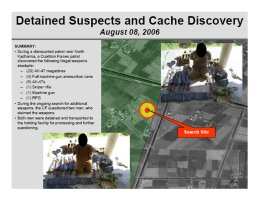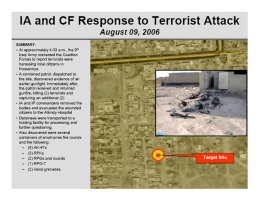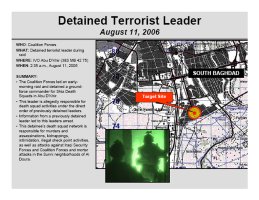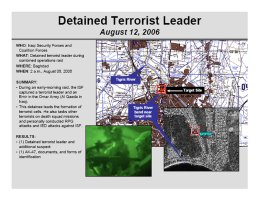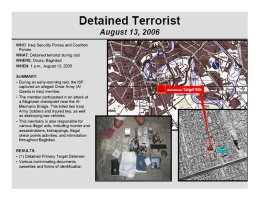
Press Briefing, Aug. 16, 2006
Multi-National Force-Iraq
Tuesday, 15 August 2006
BRIEFING BY MAJ. GEN. WILLIAM B. CALDWELL IV, SPOKESMAN FOR MULTI-NATIONAL FORCE - IRAQ TOPIC: CURRENT SECURITY OPERATIONS IN IRAQ LOCATION: THE COMBINED PRESS INFORMATION CENTER, BAGHDAD, IRAQ TIME: 9:00 A.M. EDT DATE: WEDNESDAY, AUGUST 16, 2006
(For a better look at each briefing slide, click on the slide)
GEN. CALDWELL: Good afternoon, ladies and gentlemen. Iraqi and coalition operations remain aggressive across Iraq, and especially in Baghdad, with Operation Together Forward. We are cautiously optimistic as we execute the Baghdad security operations.
On August 8th, Iraqi security forces, supported by Multinational Division Baghdad, began operations in Dura. This week, with Iraqi security forces in the lead, we extended operations into western Baghdad's beladiyas of Karmiyah (sp) and Mansour.
The combined operations are led by the soldiers of the 1st and 5th brigades from the 6th Iraqi Army Division and policemen from the 5th Brigade, 2nd Iraqi National Police Division, supported by soldiers from the 2nd Brigade Combat Team of the 1st Armored Division and soldiers from the 172nd Striker Brigade Combat Team. The operations are designed to reduce the level of murders, kidnappings, assassinations, terrorism and sectarian violence that has been noted in the northwest Baghdad area, and to reinforce Iraqis' control of its capital city.
Initial operations are focused on the search of homes and business and then expand from there.
Iraqi-led searches seek to remove illegal weapons from the streets, deny any safe haven to extremists, and seek to identify those who attempt to incite violence and disrupt the security of the city.
All across Baghdad, we are seeing progress, but of course this is only brought about because of the intent efforts of both the Iraqi security force -- specifically, the Iraqi army and the Iraqi polices.
The areas we are operating in around Baghdad were chosen because these are the areas that have shown propensity for the most violence. We are assisting the Iraqi security forces with long-term security.
Beyond these search-and-clear efforts is the economic and the essential municipal services component. The government of Iraq, with the multinational forces in support, are working very closely with the local district advisory council in the targeted areas of operations by employing local labor from the community to clean and rebuild parts of neighborhood markets and repair essential main water lines. Local contractors, assisted by U.S. engineers, are cleaning rubble off the streets.
The local district advisory council that oversees the Dura area has recently decided to form a committee down there that is comprised of both Sunni and Shi'a leaders and clerics and local police and local Iraqi security forces to specifically address issues related to the ongoing security operations. The committee will provide a coordinated and focused means to address many of the issues facing their community.
Although these same community leaders have expressed a marked improvement in security since operations began, they have also expressed their concern that more needs to be done in the municipal services sector so that people will return to their neighborhoods. Operations like the one in Dura, Shula and Amariyah neighborhoods will progress into other districts around the capital -- again, aiming to provide stability to Baghdad's most violent areas and to relief for the residents who live there.
We have a positive trend happening, but it is the will of the Iraqi people that is needed to carry this momentum. Progress thus far in the three areas that we're operating in: Nine hundred tons of trash have been removed from those three neighborhoods already, with more being removed each day. Kilometer after kilometer of barriers emplaced, building what some may call the semblance of a gated community, affording them greater security with ingress and egress routes established and manned by Iraqi security forces with coalition forces in support to ensure that the people have a safe neighborhood to live in.
More than 7,000 homes and businesses have been cleared.
Nineteen mosques have been cleared. They have detained 47 persons. Nearly 300 weapons have been seized. Eight weapon caches have been found. More than 340 weapons that Iraqi citizens are authorized to have in their homes have been properly registered and remain there with them for their personal security.
Over 700 local citizens are currently employed, with more being employed each day. The economic piece, so vital to what we are all attempting to achieve here in the Baghdad area, is starting to take place. We see new stores in Dura opening each day. Residents tell us that within Dura itself just recently, two banks have opened that have not been opened for over two years, and Iraqi security forces are down there helping provide the security necessary so that they can function in a safe environment.
The district advisory council chairman is pushing members to take responsibility and to help clean up their neighborhoods. The district advisory council is working to motivate the local population to work with both the Iraqi security forces and the coalition forces operating there.
Humanitarian assistance packages have been passed to the neighborhood advisory councils for them to decide where the greatest need is within their neighborhood, and to provide that to their citizens. Medical assistance teams have been formed and will start operating in these areas later this week.
National police and coalition force commanders are engaging with the population, both in person and by radio, to explain what's going on for the operation so that people understand what is attempting to be accomplished and how they will make the difference about what they do.
There is also a continual need to make assessments for repairs and projects, as this is a long-term program; the most immediate being to clear the area, but then we have to hold it, and then we have to build it, again, with the Iraqis in the lead and the local citizens making those key decisions through their neighborhood and district advisory councils.
I would like to talk for a moment, if I may with you all, about what occurred on Sunday evening.
Slide 1 Slide and chart, please. I would like to address the vehicle-borne improvised explosive attacks -- IED attacks that occurred in Zaafaraniyah on Sunday evening. These heinous attacks resulted in 63 innocent Iraqi civilians being killed, and approximately another 140 being wounded.
It started when two vehicles IEDs were detonated in the vicinity of a building down here in the south near the Hawer (ph) market. The combination of these vehicle-borne IEDs led to a significant gas explosion which had secondary and third-order effects of explosions. Iraqi security forces responded immediately to the scene, with the national police being the first on the site, providing immediate first aid and help to the Iraqi citizens in that area.
The explosion near the Hawer (ph) market was one of four vehicle- borne IEDs that took place within about a 30-minute period, all within about two kilometers of each other, destroying what we now know was four buildings and looks like 20 shops. And again, this is the Hawer (ph) market down here, but we know that they had two vehicle-borne IEDs that went off because of the gas explosion that set off some secondary and third-order effects, and these are the other three locations, all within about a 30-minute period.
On Monday morning, coalition explosives experts began an assessment of the attack on the Hawer (ph) market. Their initial assessment of the scene indicated the cause was a gas explosion with no indication of indirect fire, rockets or vehicle IEDs. When I spoke during Monday's press conference, that was the information we had at that time. Also, when speaking with you on Monday, my comments were specific to the explosion at the Hawer (ph) market. We were unaware at that time that what we were dealing with was multiple attacks at four different locations, as this slide best depicts. However, as I have just detailed for you, we have learned a lot more, and as with most initial reports, the details change as we investigate and we further analyze each and every situation.
We make it our priority to provide as much information as possible in a timely manner and to make every effort to ensure the facts are correct. As soon as we could confirm the details as I just recapped to you, we immediately released a press release that went out yesterday capsulizing on those same facts that we just talked about now.
Obviously, we continue operations in the Baghdad area. It's the number-one focus, as established by the prime minister of this nation, for both the coalition forces and of course his own Iraqi security forces.
What I'd like to do is talk to you a little about operations that have continued within the Baghdad areas on death squads, and other operations that continue to bring greater peace, security and stability to the Baghdad area.
Slide and chart, please.
We have conducted offensive operations we continue while at the same conducting the operations as part of Operation Together Forward down in the neighborhoods. Last week Iraqi security forces and coalition forces in support conducted, as you can see here, eight operations, five of which resulted in detainees being detained. We altogether detained 11 death squad members in these different operations.
The location with which they were conducted shows you over here (sic), the vast majority of them being down near the Dura district, is where they were conducted, again, as we were trying to leverage and support ongoing operations to bring greater peace, security and stability to the Baghdad area.
Slide and chart, please.
In addition to the specific operations that we've been conducting against the death squads, there's ongoing operations against any illegal armed group or persons operating outside the law within the Baghdad area. Here you can specifically see one that was conducted on August 8th, which resulted in two detainees and a weapons stockpile being obtained. And again, any time we start seeing sniper weapons, machine guns and RPGs, that's clearly not for self-defense that people of Baghdad are allowed to have within their homes.
Slide and chart, please.
On August 9th, Iraqi security forces, with coalition forces in support, responded to reports that terrorists were harassing local citizens in Husainiyah. And again, this is a report coming in from an Iraqi citizen to the tip line, saying that there is harassment going on by some kind of terrorist organization against the Iraqi civilians. Upon arrival, the Iraqi forces -- security forces immediately came under fire, quickly returning fire, killing two of the terrorists and capturing two more in the process. And as usual, a weapons and ordnance cache were also discovered at that location. And you can see some of the equipment there that they detained -- again, not personal weapons by any means, but in fact those intended to be used to incite sectarian violence, kidnappings, assassinations and murders.
Slide and chart, please.
On August 11th, coalition forces conducted a raid in southern Baghdad that resulted in the detention of a ground force commander for Shi'a death squads, who was allegedly responsible for violent crimes. Information from a previously detained death squad member led to this arrest. This person's death squad network was responsible for illegal checkpoints, kidnappings, acts of intimidation, murders and assassinations. Additionally, they are alleged to have conducted the attacks against the Iraqi security forces and mortar attacks in the Sunni neighborhoods of al-Dura.
Slide and chart, please.
On August 12th, Iraqi security forces, with coalition forces in support, conducted a raid in northern Baghdad, successfully capturing a terrorist leader who was an emir in the Omar Army, part of the al-Qaida in Iraq network. This person is allegedly known to have personally conducted a rocket-propelled grenade attack and IED attacks against Iraqi security forces, and was in charge of forming terrorist cells and tasking other terrorists on death squad missions. This was another terrorist that was taken off the street by the Iraqi security forces.
Slide and chart, please.
On August 13th, Iraqi security forces, with coalition forces again in support, conducted a raid in the Dura area that resulted in the capture of a suspected Omar Army member. This person is suspected of participating in an attack at a checkpoint near the Al-Meqanic (ph) Bridge, which had resulted in the deaths of two Iraqi army soldiers and injured two others, as well as destroying two of their vehicles. This person is also allegedly responsible for various illegal acts, including murder and assassinations, kidnappings and illegal checkpoints. This was another terrorist taken off the street by the Iraqi security forces in the Baghdad area as operations aggressively continue there in support of the prime minister's plan to bring greater peace and stability to the Baghdad area.
I would like to switch again here now and talk to you for a moment about the methods the terrorists pursue here in Iraq, specifically the al-Qaida network.
As you all know, we are systematically dismantling the al-Qaida network. Methodical operations have continued in a very deliberate and conscious fashion as we disrupt and disorganize that network. Recent detainees have given us the unique insight into the plans and operations of al-Qaida in Iraq and what they are doing to achieve their goals here. In discussing these efforts, detainees have provided invaluable insight into Iraq's means to its end and have also identified multiple vulnerabilities and exploitable weaknesses that the al-Qaida in Iraq leaders perceive within and from without their organization.
But to put this in context, we probably need to first remember what is the current security situation here. The core conflict in Iraq has transitioned to a struggle mostly between Sunni and Shi'a extremists seeking to control key areas of Baghdad, create or protect sectarian enclaves, divert economic resources and impose their political and religious agendas.
The sectarian violence in and around Baghdad defines the framework of the ongoing conflict in Iraq. Within Baghdad, death squads and terrorists are locked into a mutually reinforcing cycle of sectarian strife, with Sunni and Shi'a extremists portraying themselves as the defenders of their respective sectarian groups.
In regards to al-Qaida in Iraq, their leadership has outlined the end state towards which their propaganda efforts are currently working. Specifically, as given to us by those who have been detained over the last two months, they seek to portray al-Qaida in Iraq as a legitimate political organization to be viewed as the alternative to the legitimate, duly-elected government of Iraq.
Their primary goal in discrediting the government of Iraq is the expulsion of the U.S. from Iraq in order to remove support for the government of Iraq and impose themselves, al-Qaida in Iraq, as the power.
Detainees have also begun to divulge how al-Qaida in Iraq is attempting to achieve these goals. Al-Qaida in Iraq brings in other foreign fighters and terrorists for the sole purpose of killing innocent Iraqis and preventing the piece and stability that Iraqis deserve. They do not care about this nation. Al-Qaida in Iraq encourages Sunni and Shi'a in-fighting and believes a widespread sectarian divide will force the United States into neutrality and ultimately departure.
Al-Qaida in Iraq, through the media and other grassroots propaganda, will promote a theme that portrays the Sunnis as under attack by coalition forces, and the government of Iraq as being corrupt. They aim to rally Sunni support by conveying al-Qaeda in Iraq as a Sunni protectorate. They then attempt to promote themselves as the defender of the oppressed instead of a terrorist organization.
Al-Qaida in Iraq is making a concerted effort to gain legitimacy by marketing itself to the Iraqi people as a credible, helpful organization that appeals to Iraqis in desperate social and economicsituations while projecting a civic-minded image. They have produced propaganda that blames coalition forces and the Iraqi government for problems such as unemployment, security, government corruption, gas prices and the lack of power, in hopes that this will empower them to take on the role as their protectorate.
Al-Qaida in Iraq wants to present itself as a legitimate organization. They're striving to increase its operational power by building a political base with a military wing, not unlike that of other extremist organizations that have turned to politics in order to grow roots.
Al-Qaida in Iraq realizes killing of innocent Iraqi civilians has damaged their public support and is working to reverse that perception. By no means does it mean they intend to stop creating sectarian violence, but rather change the perception.
Al-Qaida in Iraq is also exploring its own version of tribal engagement. They are giving thought to engendering support from whole tribes, rather than individual Iraqi citizens. Al-Qaida in Iraq hopes to win the support of key tribal leaders and then allow them to carry the message to the rest of their tribe.
Multiple detainees conveyed frustration over their inability to also control a larger portion of the media market. These same detainees discussed al-Qaida in Iraq's desire to use broadcast television. They lamented the fact that it is becoming more and more dangerous and more difficult for them to disseminate their propaganda. One detainee stated that the safest and most preferred method of disseminating religious propaganda is handing out cassette tapes and CDs on Fridays after prayers.
In regard to recruitment, al-Qaida in Iraq offers money, cell phones and vehicles to prospective recruits. These items appear somewhat attractive to young men. However, placement and access into the inner circles is won through personal associations, demonstrated loyalty and vetted experience. Key personalities are known associates of trusted members. Abu Uzman (sp) stated that his recruiting plan for the Umar (sic) Brigade relied on his associates talking with people they knew, who then talked to others and so on.
One detainee stated there are three vulnerabilities al-Qaida in Iraq looks for in their potential recruits: one, individuals who have been detained by coalition forces in the past; two, children or a relative of individuals who have been detained or killed by coalition forces; and three, individuals that display religious values similar to those of al-Qaida in Iraq.
Within jihadist circles, an individual could only swear allegiance to al-Qaida in Iraq through sponsorship. Sponsorship is key to joining the ranks of al-Qaida, and a sponsor must be a trusted member of that organization.
Many anti-coalition organizations operating in Iraq are inherently al-Qaida in Iraq-based on their common IDs -- ideals, beliefs and goals. This binds several groups which operate underdifferent names but are essentially al-Qaida in Iraq. The Mujahideen Shura Council is an example of how al-Qaida in Iraq is attempting to mask itself by aligning with other groups, especially Iraqi groups. Their aim is to give an Iraqi identity to in al-Qaida in Iraq ideologies. Al-Qaida in Iraq anticipates this will be the path towards acceptance of its political structure and ideology by Iraqis.
However, Iraqi security forces, with coalition forces in support, continue to degrade the al-Qaida in Iraq network by removing key to mid-level leadership and aggressively targeting the internal foreign fighter facilitator networks.
As al-Qaida in Iraq attempts to recover from this degradation, they continue to be a primary instigator of sectarian violence in Iraq. A significant portion of detained terrorists are providing clear, actionable intelligence for Iraqi and coalition forces to continue the methodical, deliberate efforts to eliminate terrorism here in Iraq. Iraqi and coalition forces will continue to work closely with each other and with the Iraqi citizens to establish peace and security throughout Iraq.
And with that, I'll take whatever questions y'all have.
Q (In Arabic.)
GEN. CALDWELL: What I can share with you is what I was told by coalition force soldiers the other day when I was down in the Dura area about three days ago and then again last week. And the thing that they told me is that they let the Iraqi security forces, the Iraqi police and the Iraqi army take the lead because they find that they have the best ability to interface with the Iraqi citizens. They understand their culture better. They understand what they're looking for. They can pick up changes in dialects when they go into the homes and determine whether somebody really lives there or doesn't live there. They can look at a room and tell whether it appears to be out of place or if there is a hiding place near.
But most importantly, they are able to engender some kind of relationship right away and just by a sixth sense, as we call it, know whether or not this is probably a local citizen who actually wants greater security brought to their neighborhood.
So what we find is when we've been conducting these operations, it's truly the Iraqi security forces in the lead. You'll rarely find a coalition force conducting any of the search operations. You'll find us working in support of the Iraqi army and the Iraqi police, helping man the checkpoints with them, doing the patrols with them and providing the outer cordon and support as the Iraqi security forces truly have the lead in this operation.
We find it even in the neighborhood advisory council and the district advisory council meetings that are literally ongoing day to day. I mean, I would invite y'all, if you haven't been there to see one, it's an incredibly great sight to watch to see this evolution, this change that is occurring down in Baghdad, where you have, like in Dura, the district advisory council has formed this committee that hasnot only the citizens from Dura but now has invited in the Iraqi army and the Iraqi police. And they sit around and talk about what their greatest security needs are, and then they also discuss the ongoing projects that they would like to see undertaken to bring back the basic public services to those who live there, and then, of course, by doing so hope to draw back those who may have moved out of the area.
Q (In Arabic.)
GEN. CALDWELL: I'd encourage you to go to Dura. It is truly -- yesterday, I was meeting with two Sunni religious leaders; in fact, some very high-level Sunni religious leaders, and during that discussion, we talked specifically about what's going on in Dura. And he immediately picked up the phone and called one of his imams down in there and started talking to him and asking about what he thought about the security situation. And I'll have to paraphrase some of the things that was translated as he put them on speakerphone so we could all sit there and talk together, but he said that the imam down there was saying that they used to experience 20 to 30 incidents of deaths, assassinations, kidnappings, almost on a weekly, routine basis, without exception, and that over the last week, they have not had one. He talked about the fact that nobody would go out in the streets at night. It was just too unsafe. And during the daytime, people were very wary of each other. And now he in fact says you can see people walking all around.
He talked about how he's seen shops reopening now for the first time in literally over a year. Not large quantities yet, but he's seen one and twos each day that were not open before now opening, and people engaging and using the businesses.
And probably more important than anything else, he said, the interface he's having with the Iraqi security forces -- and he singled out the Iraqi Army Division commander -- he thought was incredible. He says that the division commander literally goes through the neighborhoods every day and talks to the citizens and asks them how things are going, what they're concerned about, how he can help. He said he's even go so far as help deliveries, had his troops help deliver some of the gas -- you know, the cooking gas that the citizens use because they have a difficult time, as this operation started, getting out of the neighborhood. So he had his soldiers go help pick up the rations and bring them to the citizens of the town. I mean, it's just a really heartwarming story to listen to, and I would very much encourage you to go down and talk to the citizens themselves in Dura. They will tell you the story far better than I ever could.
Any other questions?
Yes, sir.
Q Thanks. General, Paul von Zielbauer from The New York Times. Could I ask you a question about some of the events that have been going on in the last couple of days in this -- southern parts of Iraq? In Basra and in Karbala, for example, there have been some militias that have been fighting with government forces in trying to take over some government buildings. And in Najaf, the deputy governor said that he would advocate neighborhood militias and neighborhood security forces to provide their own sort of security. Can you just talk about what seems to be sort of an escalation of militia activity in these large, important cities in Iraq?
GEN. CALDWELL: Again, I -- we have not -- in both those locations, you know, it's the Iraqi security forces in the lead down there who are doing the reporting. So the exact extent of what's occurred is -- we're getting through our Iraqi counterparts. I know in Karbala that there was an incident. I don't have all the details. I'd have to refer you back to the Iraqi security forces, the (MODEE ?) spokesman, to talk about that specifically.
But what I do know is, from what I'm hearing from them, is the Iraqi security forces did respond, did bring things back under control between whatever groups were fighting down there, and that order was reestablished. In fact, they talked about it in terms of it being actually a very good news story and the responsiveness of the Iraqi security forces responding to requests for help there.
As far as neighborhood security goes, I know the prime minister is in dialogue about that. He's going to set the policy, he and his governance team, as to what it will be here in this country. They have not formally come out and talked about that, but I know there's ongoing discussions. And we've listened to some of those in the -- what we call the Ministerial Committee for National Security, as they've had these ongoing discussions, but we're waiting for the prime minister to make whatever decisions he is going to officially make with respect to neighborhoods. I'll let the government of Iraq make that announcement here whenever they decide what that is. But I know there is a discussion on it.
Next question.
Yes, sir?
Q (Name and affiliation inaudible.) A follow-up on his question is, like, the militias are gaining power in the south and there's Sadr City here, and you, like, tried to tackle the south part of Baghdad. But what are you going to do about Sadr City? Are you really going to move in there?
GEN. CALDWELL: As we stated, what the prime minister has said is the priority where these operations will occur first. It's based upon where he saw the greatest violence occurring within the Baghdad city, and so that's why we started -- we, the Iraqi security forces, with us and support them in Dura -- have now worked our way up to the other two beladiyas and operating there in the northwest side of the city. But he will determine what the sequencing is and where we go, but eventually, the intent is to bring security back to the entire Baghdad city. So the prime minister will make that dictate. He'll decide what sequencing this follows, where the next area of priority is. There's lots of options on the table, but he'll decide when we began where we go next.
Q Can I follow up?
GEN. CALDWELL: Sure.
Q This is a follow-up. Are you concerned about whether coordinated or not coordinated these three -- as I said, important cities seem to be having a lot of militia activities lately in the last couple of days. Are you concerned at all about whether they are coordinated or what kind of destabilizing impact they might have?
GEN. CALDWELL: Obviously, anytime there's any kind of violence that occurs we are concerned because the whole intent of what everybody's trying to achieve in this country is greater security, prosperity and unity for the Iraqi people.
So we are looking at them very carefully and talking to our Iraqi counterparts. And those two cities you talked about -- they have the lead. We're in dialogue with them. We don't have full picture yet or resolution -- exactly what occurred in both. The Iraqis, I'm sure, do, but we just don't have that.
And then down in Basra, with the situation that occurred, the Iraqi -- again, the security forces have been handling that one. I know that they did ask for some support from the British forces that are down there, which did come to their assistance, as requested.
But again, those reports are still coming in. I don't have the complete picture to give you right now, but it did not appear to be anything that was out of control. It appeared to be something that was being brought back under control.
Are there any other questions? Okay. Thank you very much.
Q Thank you.
END.
|
NEWSLETTER
|
| Join the GlobalSecurity.org mailing list |
|
|
|


